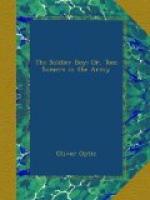Again, for weary hours, they toiled upon the march. They passed Fairfax, and encamped near the railroad station, where a full night’s rest was allowed them. By the advice of Hapgood, Tom went to a brook, and washed his aching feet in cold water. The veteran campaigner gave him other useful hints, which were of great service to him. That night he had as good reason to bless the memory of the man who invented sleep as ever Sancho Panza had, and every hour was fully improved.
At six o’clock, the next morning, the regiment marched again. Tom’s legs were stiff, but he felt so much better than on the preceding day, that he began to think that he could stand any thing. In the early part of the afternoon his ears were saluted by a new sound—one which enabled him more fully than before to realize the nature of the mission upon which he had been sent. It was the roar of cannon. On that day was fought the battle of Blackburn’s Ford; and when the regiment reached its halting-place at Centreville, the story of the fight was told by enthusiastic lips. Massachusetts men had stood firm and resolute before the artillery and musketry of the rebels, and every man who heard the story was proud that he hailed from the Old Bay State, and panted for the time when he might show himself worthy of his origin, and true to the traditions of the past.
The regiment lay in camp the two following days, and the men had an opportunity to recover in some measure from the fatigues of their first severe march. Visions of glory and victory were beginning to dawn upon them. They had listened to the cannon of the enemy, and they knew that the rebels were not many miles distant in front of them. A few days, perhaps a few hours, would elapse before the terrible conflict would commence. Some of those manly forms must soon sleep in the soldier’s grave; some of those beating hearts must soon cease to beat forever; but still the brave and the true longed for the hour that would enable them to “strike home” for the nation’s salvation.
CHAPTER XIII.
The battle of bull run.
“Tumble out! Tumble out!” shouted the sergeant, who was in the mess with the soldiers we have introduced. “Reveille! Don’t you hear it?”
“But it isn’t morning,” growled Ben Lethbridge.
“I haven’t been asleep more than an hour or two,” snarled Fred Pemberton.
“Shut up your heads, and turn out!” said the sergeant.
It was the morning of the eventful twenty-first of July, and it was only two o’clock when the regiment was roused from its slumbers; but there was no great hardship in this fact, for most of the men had been sleeping the greater portion of the time during the preceding two days. Tom Somers was ready to take his place in the line in a few moments.
“Come, fellows, hurry up,” said he to his tardy companions. “The time has come, and, I tell you, there’ll be music before many hours.”




